Record Growth in Renewable Energy: According to the IEA, They Will Surpass Coal by 2030
China Records the Highest Increase, Followed by the United States and Brazil

Global renewable energy capacity has experienced unprecedented growth, as highlighted by the International Energy Agency (IEA) in its recent report "Renewables 2023." In 2023, renewable energy reached nearly 510 GW, marking a 50% increase compared to the previous year.
Photovoltaic solar energy led this expansion, accounting for three-quarters of the new global installed capacity.
Renewable Energy: China Doubles Its Solar Capacity Compared to the Rest of the World
China showed the most significant growth, doubling its solar capacity compared to the rest of the world and increasing its wind capacity by 66%. Europe, the United States, and Brazil also reached record levels in adopting renewable energy.
This momentum aligns with the goal set during COP28 to triple global renewable energy capacity by 2030. According to IEA forecasts, by 2028, global clean energy could reach 7,300 GW, with solar and wind accounting for 95% of the projected expansion. This growth could lead renewables to surpass coal as the primary source of electricity.
Furthermore, the report highlights the significant development of wind energy and, within the context of photovoltaic solar, a 59% decrease in the prices of photovoltaic solar modules in 2023, with the prospect of global solar energy production capacity reaching 1,100 GW by 2024.
However, it emphasizes the need for more policy attention in the wind industry due to challenges such as supply chain disruptions and lengthy authorization processes.
Renewable Energy: More Needs to Be Done for Biofuels and Hydrogen
Fatih Birol, Executive Director of the IEA, underscores the need for more efforts to achieve the 2030 goal. The IEA identifies challenges such as political uncertainty, inadequate investments in network infrastructure, and administrative barriers as major obstacles.
Additionally, access to financing and robust regulatory frameworks are crucial for emerging and developing economies.
The report also examines the evolution of biofuels, with Brazil and India leading global demand, and renewable-source-based hydrogen, predicting that only 7% of announced projects will be operational by 2030.
Available documents
Related Focus






